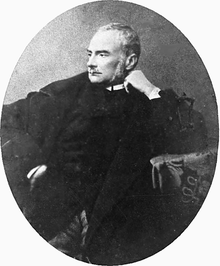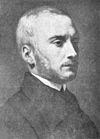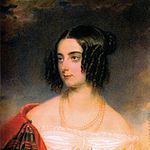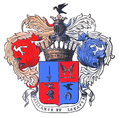- Zygmunt Krasiński
-
Zygmunt Krasiński Photo by Karol Beyer. Spouse(s) Eliza Branicka Issue with Eliza Branicka:
Władysław Krasiński
Zygmunt Jerzy Krasinski
Maria Beatrix Krasińska
Eliza KrasinskaFull name Napoleon Stanisław Adam Ludwig Zygmunt Krasiński Noble family Krasiński Father Wincenty Krasiński Mother Maria Urszula Radziwiłł Born 19 February 1812
Paris, FranceDied 23 February 1859 (aged 47)
Paris, FranceCount Napoleon Stanisław Adam Ludwig Zygmunt Krasiński (Polish pronunciation: [ˈzɨɡmunt kraˈɕiɲskʲi]; Paris, France, 19 February 1812 – 23 February 1859, Paris, France), a Polish count, is traditionally ranked with Mickiewicz and Słowacki as one of Poland's Three National Bards — the trio of great Romantic poets who influenced national consciousness during the period of Poland's political bondage.
Life and work
Krasiński was the son of a general, Count Wincenty Krasiński, of the aristocratic Krasiński family. He studied law at Warsaw University and in Geneva, where he met Adam Mickiewicz.
Krasiński was more sociopolitically conservative than the other two poets. He published much of his work anonymously.
He is best known for his philosophical Messianist ideas. His drama, Nie-boska Komedia (The Un-Divine Comedy, 1835), portrays the tragedy of an old-world aristocracy defeated by a new order of communism and democracy, and is a poetic prophecy of class conflict and of Russia's October Revolution (see also Okopy Świętej Trójcy); and his drama, Irydion (1836), deals, in the context of Christian ethics, with the struggle of a subjugated nation against its oppressor.
Krasiński's writings from the period are full of frenetic plots, strongly influenced by gothic fiction and Dante Alighieri. As the poet's most famous works show, he is most interested in the extreme face of human existence such as hate, desperation or solitude.
Krasiński's Agaj-Han (1834) is also well known in Poland. It is a historical-poetic novel, though unlike the historical novels which were popular in Poland, such as those of Walter Scott. Agaj-Han is filled by macabre motives, death and fratricide. Upon human life still exists tragic fate. Later (1844–1848) he wrote Psalmy Przyszłości (Psalms of the Future), in which Krasiński calls to love and charity according to Christianity.
His muse for many years was Countess Delfina Potocka (likewise a friend of Frédéric Chopin), with whom he conducted a romance from 1838 to 1846. Later she continued to be his friend, and he wrote for her Sen Cezary (published 1840) and Przedświt (Dawn's Approach, published 1843). Chopin set a poem by Krasiński as a song (see Polish songs by Frédéric Chopin).
On 26 July 1843, Krasiński married Polish Countess Eliza Branicka (1820–76).
See also
External links
-
Church crypt in Opinogóra Górna

The Three Bards 
Mickiewicz Słowacki Krasiński Categories:- 1812 births
- 1859 deaths
- People from Paris
- Polish poets
- Polish writers
- Polish dramatists and playwrights
- Romantic poets
- Polish Roman Catholics
- Activists of the Great Emigration
- Krasiński family
- 19th-century Polish people
Wikimedia Foundation. 2010.








